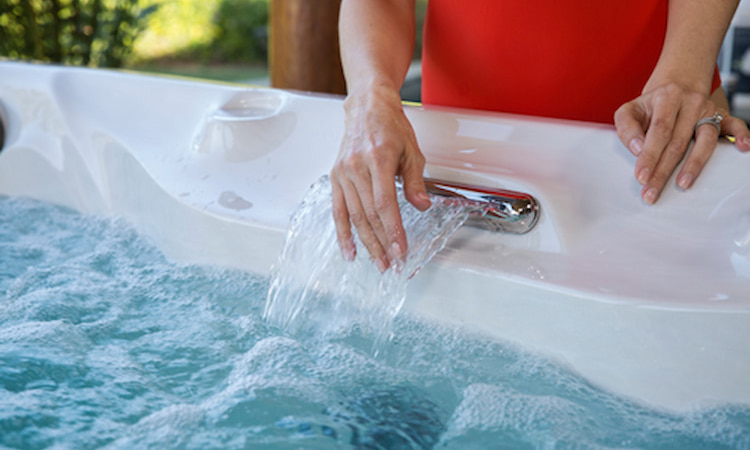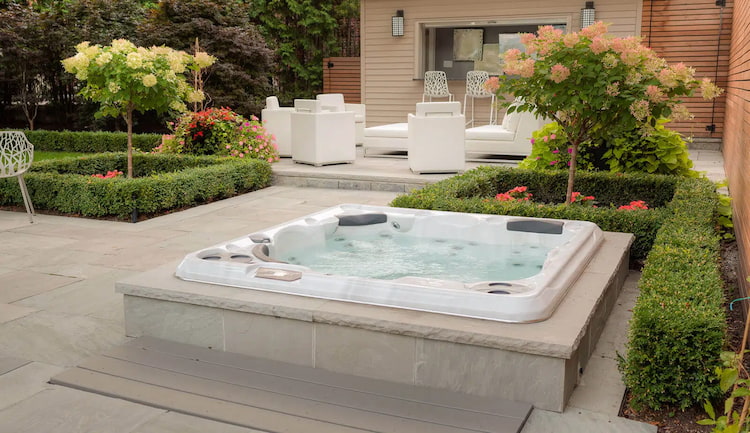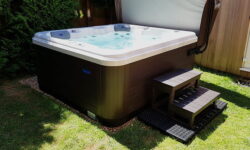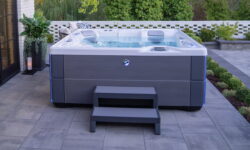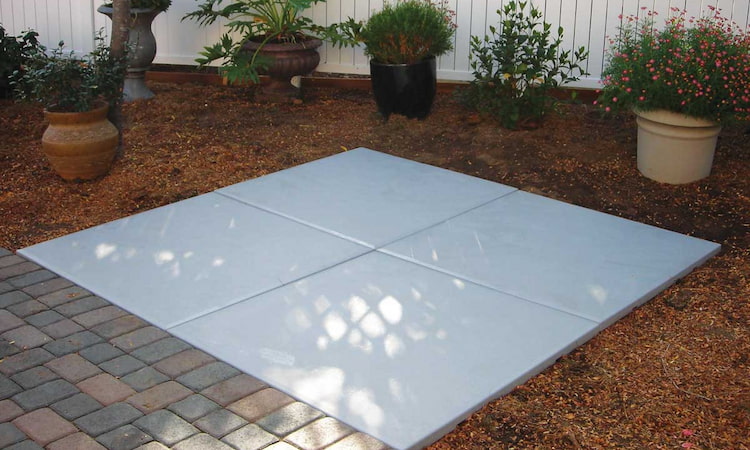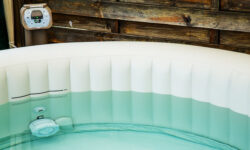You’ve got a hot tub, but it’s dry as a bone and you’re not sure how to fill it up. Don’t worry, we’ve got you covered.
You need to first ensure the hot tub is clean and the filters are in good condition. Then using a garden hose, fill the hot tub to the appropriate level, which is typically about halfway up the skimmer opening or as indicated in the hot tub’s user manual. Make sure to balance the water’s chemistry after filling, as it can affect the performance and cleanliness of the hot tub.
This guide will walk you through every step of adding water to your hot tub, teach you about the importance of water quality, and help you maintain the right chemical balance. So you’ll be soaking in your perfectly filled hot tub in no time. Let’s dive in!
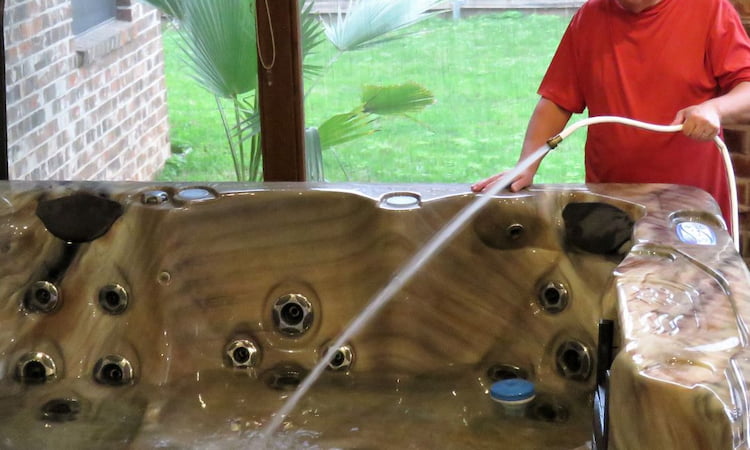
Quick Navigation
Understanding Your Hot Tub’s Water Capacity
Before you start filling it up, it’s crucial to understand your hot tub’s water capacity. This isn’t just about knowing how much water you’ll need; it also affects the balance of chemicals and the efficiency of your tub’s heater and filtration system. So, how do you determine this?
First off, check your hot tub’s manual. Manufacturers always include the water capacity. If you don’t have the manual, you can estimate it. Standard hot tubs typically hold between 400 and 500 gallons of water.
Now, let’s talk about water level. The correct water level is crucial for optimal hot tub operation. Typically, the water should reach about halfway up the skimmer intake or outlet. Too low and your pump may run dry causing it to overheat. Too high and you risk water overflowing when users get in.
In short, understanding your hot tub’s water capacity isn’t just a nice-to-know, it’s a must-know. You’re not simply filling a tub; you’re preparing an efficient, well-balanced system for relaxation and enjoyment. So go find that manual or make an educated guess, and let’s get your hot tub filled correctly.
The Importance of Water Quality for Your Hot Tub
You’ve got to keep an eye on the water quality in your hot tub, not just because it affects your comfort, but also because it plays a critical role in maintaining the longevity and functionality of your tub. Poor water quality can lead to a number of issues that are not only annoying but can also be costly.
- Health risks: Unpleasant odors, skin irritations, and even respiratory problems can arise from poor water quality. Algae and bacteria thrive in improperly balanced water, posing significant health risks.
- Damage to the hot tub: Poor water quality can corrode pipes, damage the pump, and deteriorate the tub’s surface. Hard water can cause scale build-up, leading to inefficient heating and reduced water flow.
- Reduced enjoyment: Your hot tub is meant to be a place of relaxation and enjoyment, but poor water quality can ruin the experience. Cloudy or discolored water, foul odors, and uncomfortable water temperatures can all stem from poor water quality.
As such, maintaining the water quality in your hot tub should be a top priority. Regular testing, correct chemical use, and proper filtration can help ensure your hot tub remains a safe and inviting oasis.
Step-by-Step Guide: Filling Up Your Hot Tub
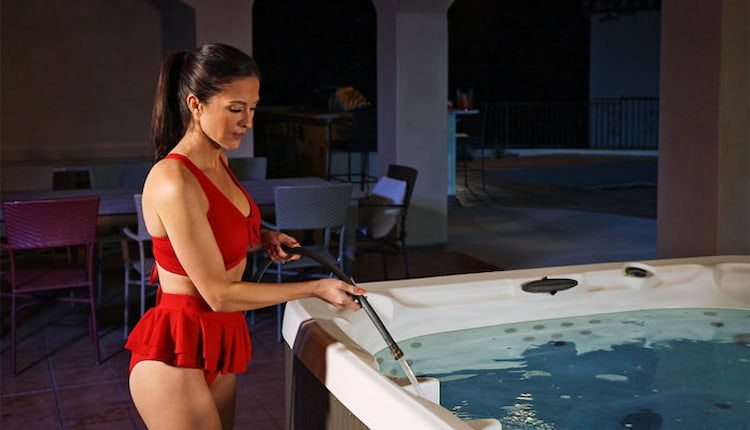
Once you’ve made sure your hot tub is clean and ready, it’s time to begin the process of filling it up.
Start by positioning your garden hose so it reaches the hot tub’s filter area. This is a key step because it reduces the risk of airlocks, a common problem that can damage your hot tub’s pump system.
First, attach your clean hose to a reliable water source. Then, place the other end in your hot tub’s filter compartment, ensuring the water flows directly into the filter. This method helps to easily purge air from the plumbing lines.
Next, turn on your water source. Make sure you’re filling your tub with a moderate flow rate, not too fast or too slow. This will minimize the chances of air getting trapped in the lines and causing issues later.
While the tub is filling, you should keep an eye on the water level. You don’t want to overfill it. Generally, the water should be just above the highest jet, or about mid-skimmer level.
Related Read: How Long Does it Take to Fill a Hot Tub?
Maintaining the Right Chemical Balance After Adding Water
Although it’s essential to fill your hot tub with the right amount of water, maintaining the correct chemical balance after adding water is just as crucial for your hot tub’s health and your own.
To maintain the right chemical balance:
1. Test the water
Use a reliable test strip to check the pH, alkalinity, and sanitizer levels. Aim for a pH level between 7.4 and 7.6, total alkalinity between 80 and 120 ppm, and adequate sanitizer levels specific to the type you’re using.
Emotionally, you’ll feel peace of mind knowing you’re soaking in safe, well-balanced water.
2. Adjust the chemicals
If the levels aren’t right, add the necessary chemicals. Always adjust alkalinity first, then pH, and lastly sanitizer.
You’ll feel empowered, and capable of managing the hot tub’s health.
3. Regularly check the balance
Don’t let it slide. Ensure you’re checking and adjusting the chemical levels at least once a week.
This habit fosters a sense of discipline and responsibility.
Troubleshooting Common Issues When Adding Water to Your Hot Tub
Often, when you’re adding water to your hot tub, you may encounter a few common issues, but don’t worry, they’re typically easy to resolve. Whether it’s a low water flow, cloudy water, or an error message on your control panel, there’s usually a straightforward solution.
Let’s break down some of these common problems and their fixes in the table below:
| Problem | Possible Cause | Solution |
|---|---|---|
| Low Water Flow | Not enough water added | Add more water to reach the recommended level |
| Cloudy Water | Improper chemical balance | Adjust your hot tub’s chemical balance |
| Error Message on Control Panel | Water level too high or too low | Adjust the water level to the recommended range |
| Water is not heating | Inadequate water flow | Check the water level and ensure the pump is working properly |
| The jets are not working | Air lock in the system | Turn off the hot tub, wait for 10 minutes, then turn it back on |
Frequently Asked Questions
The ideal hot tub water temperature is between 100 and 102 degrees Fahrenheit. However, don’t exceed 104 degrees, it’s the maximum safe limit. Remember, personal comfort varies, so find what suits you best in this range.
Once you’ve filled your tub, it’ll take around 4-6 hours to heat the water to the ideal 100-102°F range. It’s quicker with a higher kilowatt heater. Remember, don’t rush it, let the heater do its job.
You should change your hot tub’s water every three to four months. This timeframe can vary depending on usage and water quality. Regularly testing and adjusting your water’s chemistry helps extend the time between changes.
Sure, you can use tap water to fill your hot tub. There’s no need for special water. However, it’s crucial to balance the water’s pH and alkalinity levels before you begin soaking.
If your hot tub starts to overflow, immediately turn off the water source. Then, drain some water until it’s at the recommended level, typically just above the highest jets. Always monitor the filling process.
Conclusion
In sum, knowing your tub’s water capacity and quality importance is key to effective hot tub maintenance. By following our step-by-step guide, you can fill your tub with ease.
Remember to maintain the correct chemical balance post-water addition to ensure longevity. Don’t stress over common issues when adding water; troubleshooting is a breeze with our tips. So, enjoy your hot tub experience, knowing you’ve mastered the art of water maintenance!

